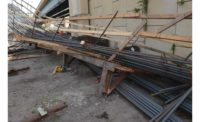Despite a formal protest from the second-place bidder for a 3,000-ton-per-day waste-to-energy facility, the Solid Waste Authority of Palm Beach County awarded a $668-million design-build contract to a team of Babcock & Wilcox and BE&K to design, construct and operate the facility.
B&W’s design-build estimate of $668 million was roughly $62 million higher than that of Wheelabrator, the division of Waste Management Corp. that placed second. However, SWA factored in the value of electrical generation and recoverable materials that each team guaranteed that their respective designs would deliver to the authority for a net present value calculation, according to Ray Schauer, SWA’s director of engineering and public works.
Under that calculation, because B&W’s proposal guaranteed the greatest amount of electrical generation and material recovery, its bid was considered the lowest cost, with a value of nearly $500.5 million. The net present value of Wheelabrator’s proposal was calculated at $626.6 million.
Construction should start by late 2012, with commercial operation planned by May 2015.
In a ranking of the competing proposals on “non-cost” issues, such as labor hiring pans, however, Babcock & Wilcox ranked third overall, while a proposal from Covanta was rated highest.
Wheelabrator issued a formal protest of the awarding of the contract to Babcock & Wilcox, asserting that B&W’s partnership with BE&K to build the facility violated SWA’s requirement for a single entity to manage the project. The company also cited technical issues with B&W’s design.
The contract covers design, construction, start-up, acceptance testing and long-term operation and maintenance of a new mass burn waste-to-energy facility that will process approximately 3,000 tons per day of municipal solid waste. SWA is mandating that the facility be operational by 2015 or sooner.
The new facility will complement SWA’s existing 2,000-tpd waste-to-energy facility, which is operated by the Palm Beach Resource Recovery Corp., a subsidiary of B&W. The latest project addresses the SWA’s plan to manage solid waste through source reduction, recycling, composting, combustion and landfilling.



